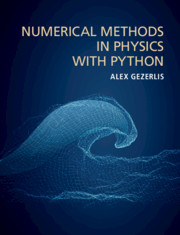
-
Select format
-
- Publisher:
- Cambridge University Press
- Publication date:
- 14 August 2020
- 27 August 2020
- ISBN:
- 9781108772310
- Dimensions:
- Weight & Pages:
- Dimensions:
- Weight & Pages:
You may already have access via personal or institutional login
Book description
Bringing together idiomatic Python programming, foundational numerical methods, and physics applications, this is an ideal standalone textbook for courses on computational physics. All the frequently used numerical methods in physics are explained, including foundational techniques and hidden gems on topics such as linear algebra, differential equations, root-finding, interpolation, and integration. Accompanying the mathematical derivations are full implementations of dozens of numerical methods in Python, as well as more than 250 end-of-chapter problems. Numerical methods and physics examples are clearly separated, allowing this introductory book to be later used as a reference; the penultimate section in each chapter is an in depth project, tackling physics problems which cannot be solved without the use of a computer. Written primarily for students studying computational physics, this textbook brings the non-specialist quickly up to speed with Python before looking in detail at the numerical methods often used in the subject.
Reviews
'I enthusiastically recommend Numerical Methods in Physics with Python by Professor Gezerlis to any advanced undergraduate or graduate student who would like to acquire a solid understanding of the basic numerical methods used in physics. The methods are demonstrated with Python, a relatively compact, accessible computer language, allowing the reader to focus on understanding how the methods work rather than on how to program them. Each chapter offers a self-contained, clear, and engaging presentation of the relevant numerical methods, and captivates the reader with well-motivated physics examples and interesting physics projects. Written by a leading expert in computational physics, this outstanding textbook is unique in that it focuses on teaching basic numerical methods while also including a number of modern numerical techniques that are usually not covered in computational physics textbooks.'
Yoram Alhassid - Yale University, Connecticut
'In Numerical Methods in Physics with Python by Gezerlis, one finds a resource that has been sorely missing! As the usage of Python has become widespread, it is too often the case that students take libraries, functions, and codes and apply them without a solid understanding of what is truly being done ‘under the hood’ and why. Gezerlis’ book fills this gap with clarity and rigor by covering a broad number of topics relevant for physics, describing the underlying techniques and implementing them in detail. It should be an important resource for anyone applying numerical techniques to study physics.'
Luis Lehner - Perimeter Institute, Ontario
'Gezerlis’ text takes a venerable subject – numerical techniques in physics – and brings it up to date and makes it accessible to modern undergraduate curricula through a popular, open-source programming language. Although the focus remains squarely on numerical techniques, each new lesson is motivated by topics commonly encountered in physics and concludes with a practical hands-on project to help cement the students’ understanding. The net result is a textbook which fills an important and unique niche in pedagogy and scope, as well as a valuable reference for advanced students and practicing scientists.'
Brian Metzger - Columbia University, New York
Contents
Metrics
Altmetric attention score
Full text views
Full text views help Loading metrics...
Loading metrics...
* Views captured on Cambridge Core between #date#. This data will be updated every 24 hours.
Usage data cannot currently be displayed.
Accessibility standard: Unknown
Why this information is here
This section outlines the accessibility features of this content - including support for screen readers, full keyboard navigation and high-contrast display options. This may not be relevant for you.
Accessibility Information
Accessibility compliance for the PDF of this book is currently unknown and may be updated in the future.


